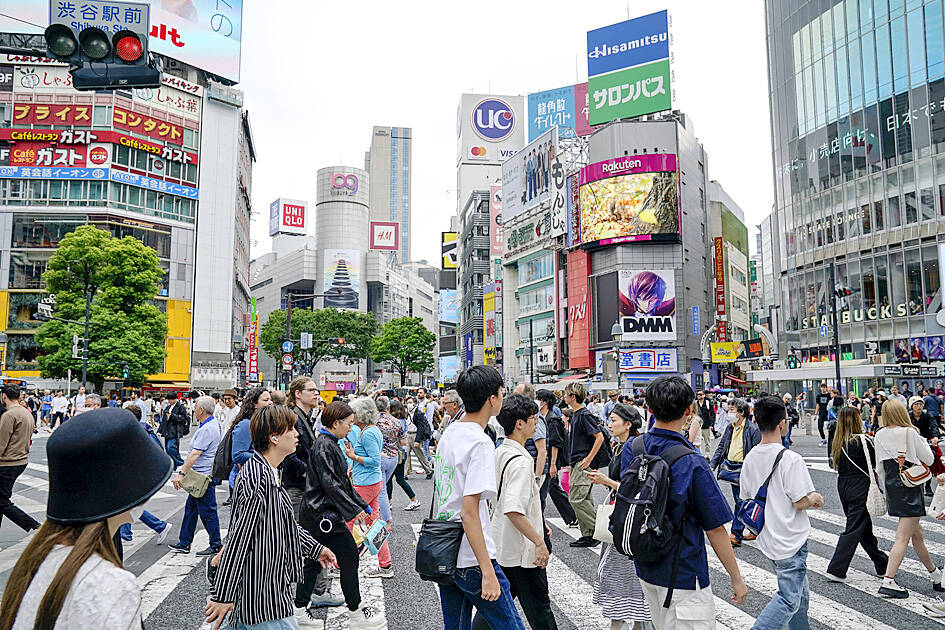Japan’s economy showed scant signs of a recovery with a narrower-than-estimated contraction, leaving plenty of reason for continued caution among policymakers, as the Bank of Japan (BOJ) eyes the timing of its next interest rate hike.
GDP shrank at an annual pace of 1.8 percent in the three months through March compared with a 2 percent retreat reported in preliminary data, the Japan’s Cabinet Office said yesterday.
Economists had forecast the updated figures would be unchanged.

Photo: EPA-EFE
Consumers and companies are cutting back on spending, and unsold supplies are building up on warehouse shelves, as the inflation trend continues to crimp outlays in real terms, data showed.
“The data confirmed weakness in consumption. A breakdown shows spending on durable goods was weak, which I think reflected the impact of the Daihatsu problem on auto purchases,” Daiwa Securities economist Toru Suehiro said. “The BOJ doesn’t have a choice but to be cautious about the economy.”
Personal consumption data were left unchanged at minus-0.7 percent, marking a fourth quarter of decline, while business spending figures were revised to minus-0.4 percent from a preliminary decline of 0.8 percent.
Inventories added 0.3 percentage points to growth, while net exports were tweaked to reflect a slightly larger drag on the economy.
A rebound in growth in the current quarter is widely expected, as the economy recovers from the effects of one-off factors, including a New Year’s Day earthquake northwest of Tokyo.
An auto production halt due to a certification scandal also weighed on growth. While output has since been restored, a fresh scandal might exert a drag on the current quarter.
Among risks to the outlook, households are set to see a rise in utility costs, as the government phases out subsidies.
Meanwhile, workers have seen declines in real wages for more than two years, while retirees on fixed income have been hit even harder, as they cope with inflation at or above the BOJ’s 2 percent target.
Higher costs for imports due to the yen’s slump might further lift food and energy prices.
Still, analysts expect real wages adjusted for inflation to turn positive in coming months after annual wage talks resulted in pledges by large companies to lift pay by more than 5 percent.
The weak yen also has some positive effects for the economy, boosting corporate earnings abroad and inbound tourism.
The BOJ is likely to discuss the reduction of its government bond purchases as early as this week, as it continues to normalize its policy following its historic interest rate hike in March, people familiar with the matter said.
Economists expect the central bank to hold its benchmark policy rate steady at a two-day meeting concluding on Friday, with many predicting a hike by October.

SEEKING CLARITY: Washington should not adopt measures that create uncertainties for ‘existing semiconductor investments,’ TSMC said referring to its US$165 billion in the US Taiwan Semiconductor Manufacturing Co (TSMC, 台積電) told the US that any future tariffs on Taiwanese semiconductors could reduce demand for chips and derail its pledge to increase its investment in Arizona. “New import restrictions could jeopardize current US leadership in the competitive technology industry and create uncertainties for many committed semiconductor capital projects in the US, including TSMC Arizona’s significant investment plan in Phoenix,” the chipmaker wrote in a letter to the US Department of Commerce. TSMC issued the warning in response to a solicitation for comments by the department on a possible tariff on semiconductor imports by US President Donald Trump’s

‘FAILED EXPORT CONTROLS’: Jensen Huang said that Washington should maximize the speed of AI diffusion, because not doing so would give competitors an advantage Nvidia Corp cofounder and chief executive officer Jensen Huang (黃仁勳) yesterday criticized the US government’s restrictions on exports of artificial intelligence (AI) chips to China, saying that the policy was a failure and would only spur China to accelerate AI development. The export controls gave China the spirit, motivation and government support to accelerate AI development, Huang told reporters at the Computex trade show in Taipei. The competition in China is already intense, given its strong software capabilities, extensive technology ecosystems and work efficiency, he said. “All in all, the export controls were a failure. The facts would suggest it,” he said. “The US

The government has launched a three-pronged strategy to attract local and international talent, aiming to position Taiwan as a new global hub following Nvidia Corp’s announcement that it has chosen Taipei as the site of its Taiwan headquarters. Nvidia cofounder and CEO Jensen Huang (黃仁勳) on Monday last week announced during his keynote speech at the Computex trade show in Taipei that the Nvidia Constellation, the company’s planned Taiwan headquarters, would be located in the Beitou-Shilin Technology Park (北投士林科技園區) in Taipei. Huang’s decision to establish a base in Taiwan is “primarily due to Taiwan’s talent pool and its strength in the semiconductor

French President Emmanuel Macron has expressed gratitude to Hon Hai Precision Industry Co (鴻海精密) for its plan to invest approximately 250 million euros (US$278 million) in a joint venture in France focused on the semiconductor and space industries. On his official X account on Tuesday, Macron thanked Hon Hai, also known globally as Foxconn Technology Group (富士康科技集團), for its investment projects announced at Choose France, a flagship economic summit held on Monday to attract foreign investment. In the post, Macron included a GIF displaying the national flag of the Republic of China (Taiwan), as he did for other foreign investors, including China-based